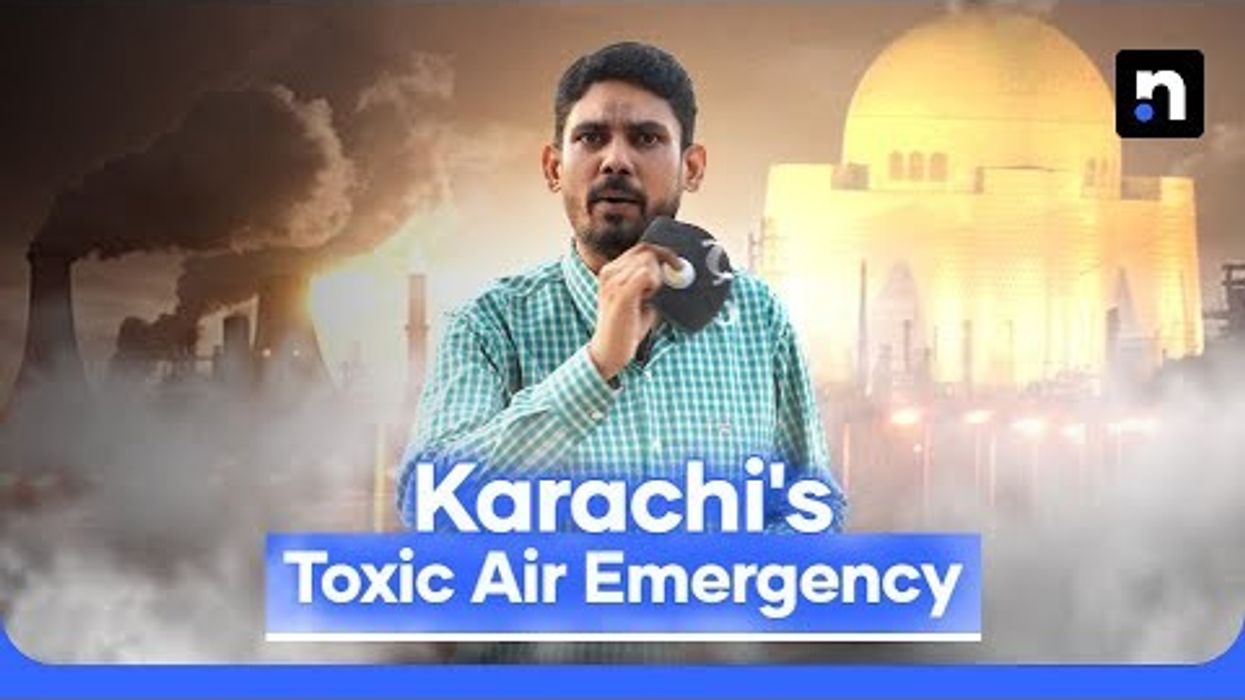Karachi residents battle pollution as 'smog-free' city chokes on toxic air
At this rate, surviving without an N95 mask would soon become impossible, says doctor
Muhammad Wasi Qureshi
Senior Producer, Karachi Desk
Muhammad Wasi is a seasoned journalist with 16 years of experience in reporting and production. He began his career at Geo News in 2007, later joining Channel 24 in 2015, and then Dunya News. Over the years, he has produced various impactful programs across these major networks. Currently, he serves as a Senior Producer at Nukta Pakistan, continuing his dedication to storytelling and in-depth journalism.
As Karachi resident Minha Qadri, 35, navigates her daily routines, she feels a growing sense of dread with each seasonal shift.
Having endured asthma for the past 12 years, she finds that simple tasks like cooking, cleaning, or airing out winter clothes now spark intense allergic reactions, leaving her struggling to breathe.
“The air pollution in Karachi has worsened to the extent that, despite taking precautions, I hesitate to step outside,” she said.
“The smoke from vehicles and the constant burning of garbage make survival difficult.”
Minha’s two young children, a 12-year-old daughter and a 6-year-old son, also suffer from asthma, making the health risks of Karachi's worsening air quality a very personal battle for her family. Across Pakistan, rising air pollution has turned everyday life into an ordeal for countless families.
98% Pakistanis at risk
According to the Air Quality Life Index, 238 million Pakistanis live in areas where pollution levels exceed the World Health Organization’s (WHO) guidelines, and over 98% of the population resides in regions with air pollution higher than even Pakistan's national standards.
The air pollution problem has grown particularly severe in Pakistan’s major cities, with Lahore, Faisalabad, and Karachi seeing sharp increases in respiratory illnesses. Lahore, notably, recently introduced its first ‘green lockdown’ to address the crisis.
Winter triggers respiratory ailments
Lung doctor Dr. Talha Shehzad explains that winter triggers a surge in respiratory ailments.
His patients with asthma, allergies, and pneumonia increase nearly fivefold during the colder months.
“Cold air irritates the respiratory tract, raising the risk of infection and aggravating existing conditions,” he said.
Globally, air pollution claims over four million lives each year, and its links to asthma, pneumonia, chronic obstructive pulmonary disease (COPD), and even heart disease have become alarmingly clear, especially in the colder months.
Karachi air has harmful PM2.5 particles
A recent study published by Aga Khan University (AKU) in the ‘Atmospheric Pollution Research’ journal reveals that Karachi’s air carries dangerously high levels of harmful particulate matter, including PM2.5 particles.
These fine particles, small enough to be inhaled deeply into the lungs, contribute to various health issues.
The study found significant amounts of sulfate, ammonium, nitrate, and black carbon, all of which compromise air quality and impact respiratory health.
“Karachi’s PM2.5 levels are among the highest compared to other cities globally,” says Professor Zafar Fatmi, head of the Environmental Occupational Health and Climate Change division at AKU.
“PM 2.5 exposure poses grave respiratory risks, including chronic bronchitis and lung infections. We’ve seen that these particles worsen pre-existing respiratory conditions and contribute to strokes, kidney diseases, heart issues, premature births, and low birth weights. Life expectancy in our largest cities has dropped by 4-7 years due to these pollutants,” he said.
Surviving without N95 masks may soon be impossible: doctor
Speaking with Nukta, Dr. Fatmi emphasized that Karachi’s air pollution levels have become so severe that surviving without N95 masks may soon be impossible.
He urged officials to treat this as a public health emergency and to implement a coordinated effort to combat pollution.
Dr. Fatmi said that with mass transit systems and large buses replacing individual vehicles, pollution levels could see significant reductions within two to three years, citing Chinese cities as examples of successful air pollution management.
Experts emphasize the need to monitor and publicize air pollution levels as a way to raise awareness and pressure government bodies for action.
Bilawal's 'Move to Karachi' call backfire
Adding to the irony of Pakistan’s air quality crisis, former Foreign Minister Bilawal Bhutto Zardari recently suggested that Lahore residents suffering from severe smog should seek refuge in Karachi.
His party, the Pakistan People's Party (PPP), has a stronghold in the province of Sindh where Karachi is the capital.
Bilawal took a jab at the Punjab government by tweeting "Dear Pakistan, move to Karachi." Attached is a city-by-city air quality ranking where Karachi performed better than other cities.
But officials in the Sindh Environmental Protection Agency (SEPA) lament the absence of effective, large-scale policies at the government level.
“Comprehensive policies are needed,” he said, “but without coordinated efforts between SEPA, the Sindh Solid Waste Management Board, municipal authorities, transport departments, and the commissioners’ office, the situation remains challenging.”
He added that monitoring equipment is expensive, limiting SEPA’s ability to gather essential data across the city.
He quoted an example of the American Consulate in Karachi, which installed a device on its own that costs 1.5 billion rupees ($5350,000), but it only covers a one-kilometer radius.
As air quality continues to deteriorate, millions of Karachi's residents are left with few options. Surgical masks have become a common sight, though experts now recommend N95 masks as the only viable protection.
Karachi's toxic air demands a collective response, and experts warn that it's time to address air pollution as a public health crisis. Measures to reduce PM2.5 levels and protect public health are urgently needed.











Comments
See what people are discussing